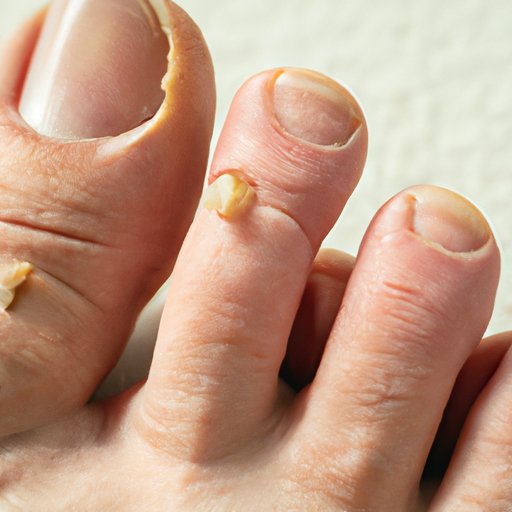Introduction
Nail fungus is an infection that affects the nails. It is caused by a group of fungi called dermatophytes and can spread from person to person. It can also be caused by yeast or mold. The infection usually starts in the nail bed and can spread to the surrounding skin. Symptoms of nail fungus include discoloration, thickening, crumbling, and streaking of the nails.

Overview of Contagious Nail Fungus
Nail fungus is highly contagious and can spread through direct contact with an infected person or object. It can also be spread through sharing items such as nail clippers, nail files, and other grooming tools. Poor hygiene practices, exposure to unsanitary conditions, and weak immune systems can increase the risk of catching nail fungus.
Exploring the Risk Factors of Contagious Nail Fungus
There are several risk factors associated with contracting nail fungus. Poor hygiene practices, such as not washing hands regularly or not changing socks or shoes often enough, can increase the chances of catching nail fungus. Exposure to unsanitary conditions, such as public showers or swimming pools, can also increase the risk. People with weakened immune systems, such as those with HIV/AIDS or diabetes, are at greater risk of developing nail fungus.
How to Prevent Spreading Nail Fungus
The best way to prevent spreading nail fungus is to practice good personal hygiene. This includes washing hands regularly, wearing clean socks and shoes, and keeping nails trimmed and clean. It is important to avoid sharing items such as nail clippers and files with others, as this can spread the infection. In addition, it is important to wear shoes and socks in public places such as swimming pools and locker rooms.
Diagnosing and Treating Nail Fungus
If you think you may have nail fungus, it is important to visit a doctor for diagnosis. A doctor will examine your nails and may take samples to test for the presence of fungi. Treatment options for nail fungus include antifungal medications, laser therapy, and topical creams. In some cases, surgery may be required to remove the infected nail.
What You Need to Know About Contagious Nail Fungus
It is important to be aware of the signs and symptoms of nail fungus, as well as the available treatment options and prevention tips. If you think you may have nail fungus, it is important to visit a doctor for diagnosis and treatment. It is also important to practice good personal hygiene and avoid sharing items such as nail clippers and files.

Common Causes of Nail Fungus
Nail fungus is commonly caused by moisture and humidity, poor hygiene, and contact with contaminated objects. Moisture and humidity can create an ideal environment for fungal growth. Poor hygiene can lead to the accumulation of dirt and bacteria on the nails, which can provide a source of food for fungi. Contact with contaminated objects, such as sharing nail clippers or files, can also lead to the spread of nail fungus.

Tips for Recognizing Nail Fungus Symptoms
The most common symptom of nail fungus is a change in color or texture of the nails. The nails may become thicker, brittle, or crumbly. Discoloration or streaking may also occur. Other symptoms may include pain, itching, and a foul odor.

Understanding the Link Between Nail Fungus and Other Health Conditions
Nail fungus can be linked to other health conditions, such as diabetes, circulatory problems, and immune system disorders. People with diabetes or poor circulation are more likely to develop nail fungus due to their weakened immune systems. People with immune system disorders, such as HIV/AIDS, are also more prone to getting nail fungus.
Conclusion
Nail fungus is a highly contagious infection that can be spread through direct contact with an infected person or object. It is important to be aware of the risk factors and prevention tips associated with nail fungus. It is also important to recognize the signs and symptoms of nail fungus and seek medical advice for proper diagnosis and treatment. Following these tips can help reduce the risk of catching and spreading nail fungus.


